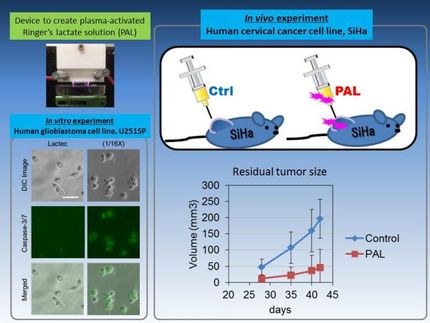Progress toward artificial tissue?
Soft and tough like biological tissue: DNA-wrapped carbon nanotubes
For modern implants and the growth of artificial tissue and organs, it is important to generate materials with characteristics that closely emulate nature. However, the tissue in our bodies has a combination of traits that are very hard to recreate in synthetic materials: It is both soft and very tough. A team of Australian and Korean researchers led by Geoffrey M. Spinks and Seon Jeong Kim has now developed a novel, highly porous, sponge-like material whose mechanical properties closely resemble those of biological soft tissues. As reported in the journal Angewandte Chemie, it consists of a robust network of DNA strands and carbon nanotubes.
Soft tissues, such as tendons, muscles, arteries, and skin or other organs, obtain their mechanical support from the extracellular matrix, a network of protein-based nanofibers. Different protein morphologies in the extracellular matrix produce tissue with a wide range of stiffness. Implants and scaffolding for tissue growth require porous, soft materials -- which are usually very fragile. Because many biological tissues are regularly subjected to intense mechanical loads, it is also important that the implant material have comparable elasticity in order to avoid inflammation. At the same time, the material must be very strong and resilient, or it may give out.
The new concept uses DNA strands as a matrix; the strands completely "wrap" the scaffold-forming carbon nanotubes in the presence of an ionic liquid, networking them to form a gel. This gel can be spun: just as silk and synthetic fibers can be wet-spun for textiles, the gel can be made into very fine threads when injected into a special bath. The dried fibers have a porous, sponge-like structure and consist of a network of intertwined 50 nm-wide nanofibers. Soaking in a calcium chloride solution further cross-links the DNA, causing the fibers to become denser and more strongly connected.
These spongy fibers resemble the collagen fiber networks of the biological extracellular matrix. They can also be knotted, braided, or woven into textile-like structures. This results in materials that are as elastic as the softest natural tissues while simultaneously deriving great strength from the robust DNA links.
An additional advantage is the electrical conductivity of the new material, which can thus also be used in electrodes for mechanical actuators, energy storage, and sensors. For example, the researchers were able to produce a hydrogen peroxide sensor. The carbon nanotubes catalyze the oxidation of hydrogen peroxide, which results in a measurable current. Hydrogen peroxide plays a role in normal heart function and certain heart diseases. A robust sensor with elasticity similar to the heart muscle would be of great help in researching these relationships.
Original publication: Geoffrey M. Spinks et al.; "Tough Supersoft Sponge Fibers with Tunable Stiffness from a DNA Self-Assembly Technique"; Angewandte Chemie International Edition 2009
Topics
Organizations
Other news from the department science
These products might interest you

Hose pressure transducer by HiTec Zang
Contactless pressure measurement for sterile applications
Easy-to-install tubing pressure sensors for diameters from 4.8-19.1 mm

FireSting-PRO by PyroScience
New fiber optic measuring device: Precise measurements even in the smallest volumes
Measure pH, oxygen and temperature even under sterile conditions

Get the life science industry in your inbox
By submitting this form you agree that LUMITOS AG will send you the newsletter(s) selected above by email. Your data will not be passed on to third parties. Your data will be stored and processed in accordance with our data protection regulations. LUMITOS may contact you by email for the purpose of advertising or market and opinion surveys. You can revoke your consent at any time without giving reasons to LUMITOS AG, Ernst-Augustin-Str. 2, 12489 Berlin, Germany or by e-mail at revoke@lumitos.com with effect for the future. In addition, each email contains a link to unsubscribe from the corresponding newsletter.
Most read news
More news from our other portals
Last viewed contents
Crotalus_horridus
Crotalus_totonacus
Derrick_Lonsdale
Crotalus_molossus
Crotalus_tortugensis




















































